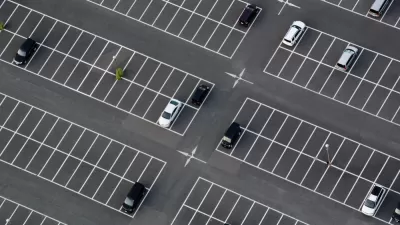The location of parked cars can either destroy walkability or enhance it, writes urbanist Steve Mouzon.
Forcing cars off the street damages urbanism and the environment in different ways, writes Mouzon, depending on whether they're parked in front of the building, beside it, or behind it. Surface parking and parking decks damage both in their own ways as well. On-street parking, on the other hand, has several virtues, including the fact that it forms a pedestrian shield, and that it helps adjacent retail to thrive:
"One major source of fear is the possibility that a car might run off the street and hit you. On-street parking alleviates this fear, because each of those park cars acts as a shield of several thousand pounds of metal between you and the moving traffic. People don't consciously realize this all the time, but you've never seen a sidewalk cafe next to the expressway, have you?"
Thanks to Steve Mouzon
FULL STORY: The Importance of On-Street Parking

Maui's Vacation Rental Debate Turns Ugly
Verbal attacks, misinformation campaigns and fistfights plague a high-stakes debate to convert thousands of vacation rentals into long-term housing.

Planetizen Federal Action Tracker
A weekly monitor of how Trump’s orders and actions are impacting planners and planning in America.

San Francisco Suspends Traffic Calming Amidst Record Deaths
Citing “a challenging fiscal landscape,” the city will cease the program on the heels of 42 traffic deaths, including 24 pedestrians.

Defunct Pittsburgh Power Plant to Become Residential Tower
A decommissioned steam heat plant will be redeveloped into almost 100 affordable housing units.

Trump Prompts Restructuring of Transportation Research Board in “Unprecedented Overreach”
The TRB has eliminated more than half of its committees including those focused on climate, equity, and cities.

Amtrak Rolls Out New Orleans to Alabama “Mardi Gras” Train
The new service will operate morning and evening departures between Mobile and New Orleans.
Urban Design for Planners 1: Software Tools
This six-course series explores essential urban design concepts using open source software and equips planners with the tools they need to participate fully in the urban design process.
Planning for Universal Design
Learn the tools for implementing Universal Design in planning regulations.
Heyer Gruel & Associates PA
JM Goldson LLC
Custer County Colorado
City of Camden Redevelopment Agency
City of Astoria
Transportation Research & Education Center (TREC) at Portland State University
Jefferson Parish Government
Camden Redevelopment Agency
City of Claremont




























